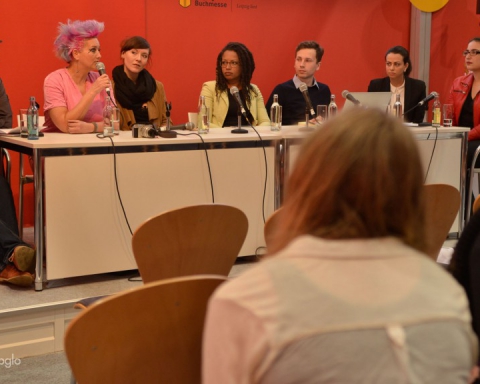
Or, Perhaps a Re-interpretation of Keats’ “La Belle dame sans merci”
With anguish moist and fever dew
– John Keats
For every soul that says they don’t understand the opposite sex, I think what they are really saying is they don’t understand themselves.
A wise but troubled and difficult man once told me when people talk, they talk about themselves.
And when writers write, they write themselves and when the reader reads, as Proust once noted, he or she is reading themselves. Yet similarly: “Where there is personal liking we go,” – Marianne Moore.
A few years back, a paper was released through the New School for Social Research in New York wherein psychologist David Comer Kidd and Emanuel Castona proved that “…reading literary fiction enhances the ability to detect and understand other people’s emotions, a crucial skill in navigating complex social relationships.”
I think it should also be said that reading also improves our own capacity to feel compassion for ourselves.
Even mercy.

And I think this is why I turn to the pages of the romantic though ill-fated English poet, John Keats. Again and again, I return to his poem, “La Belle Dame sans Mercy” (the version published originally in The Indicator) like an ill man in need of a balm.
The poem is half-wrapped up in mystery and yet, sensuously detailed. Keats paints a scene without completely telling us who the narrator is. One wonders: Is he a knight or a mere farmer finding the elfin girl?
Moreover, the mystery deepens as we wonder: who is the beautiful and “merciless” one? A ghost perhaps or a myth, a dream, a Circe-like deity in the woods? I, myself, am reminded of the rusalka of Slavic tradition and most of us are familiar with the sirens of The Odyssey. In the Bible, we have Salome and her hypnotic and enticing dance of the seven veils.
“La Belle” in Keats’s poem is certainly a femme-fatale, a kind of Carmen or a female version of Loki, a trickster. A tiny and tender destroyer of worlds.
And souls.

The poem’s narrator is by a lake, alone and “palely loitering”. There is an element of desolation in the scene. Because it is such a beautiful poem, I see a piece of myself wandering along with this person and cannot help placing myself in the lost and lonely moment. But then there is more to the story I can relate to.
For every non-relationship, everyone that never-quite came to be, I realized I was acting just like the White Knight, a Percival, a naive fool, impelled to be the rescuer. The so-called hero takes the girl and puts her on his “pacing steed” and sees “nothing else… all day long”.
So blinded is he by the good he thinks he is doing, the narrator longs to rescue the forest child but it is actually she who is in control as she allows him to take her back to where she resides. He puts her on his pacing steed but she holds the reigns – so to speak. At first, she beguiles him with her ritual gathering of “roots of relish sweet, and honey wild, and manna dew” but once they are together and he kisses her eyes asleep, it is he, I soon realize, who is the sleeping one, the one foolishly lost and unaware.
Whenever I reach the poem’s climax, a chill always sweeps over my arms and back for, after falling asleep, the girl at his side, he dreams horrid dreams:
I saw pale kinds, and princes too,
Pale warriors, death-pale were they all;
Who cried, ‘La belle Dame sans mercy
Hath thee in thrall!’
I saw their starv’d lips in the gloom
With horrid warning gaped wide,
And I awoke, and found me here
On the cold hill side.
Within these two stanzas, I see the ghosts of those who tried to intercede and help the young lady, the wild child. But as the Austrian poet Georg Trakl once wrote in his native language: “All roads lead to black decay” (Alle Straßen münden in schwarze Verwesung). Or perhaps the same idea in English: “The path to hell is lined with good intentions”.
But I think that being naive is to half-dream and also half-drown in the expectations we have of others. The drowning ones

are beautiful and to play the rescuer is to play an unrealistic role in a fairy tale. Christians since the dawn of Christianity have wanted to save everyone. They live in the belief they have found the right path while everyone else is lost. Still, in their minds, bless their hearts, this idea shapes their interpretation of others. Instead of seeing people as doing their best to survive, to be kind and to somehow make it through a day, they see the sinner as floundering in a sea of sin. They hate the sea of sin and put out their hand for the sinner.
I believe that to be a rescuer is to be naive. The one supposedly in need of rescue resides in a liminal place, a place-in-between and just like in the Keats poem, not a place of definition but a form of transition for the narrator who awakens as if abandoned, with the sad awareness that the “elfin grot” was a mere illusion.
So sweet but so saddening, don’t you think?
Yet to be the rescuer is to strengthen the already-poisonous ego. The urge to rescue is actually a means to control just as the Christian desires to control the future of the one supposedly in need of rescue.
And for someone like myself, having wanted to rescue and failed, the failure was always inevitable because the longing to rescue came from a place of low-self-esteem, low self-worth. I wanted to be wanted by all the elfin grot girls, all the Circe-like ladies who floated around me and by me but never allowed me to hold on. For like the hapless narrator in Keats, I awoke so often in a place of bewilderment, trapped in a kind of anger, a flailing against the self and the pathetic fate I felt encasing and stifling me.
And it was good I always awoke alone, it was for the best for I would have gone down with each and every one of them, to a lower place within myself. But I believe it is our role and right to improve our lot, to hold back from throwing ourselves over dangerous edges. I believe virtue is something less recognized from the outside but something we alone can recognize within ourselves – that we need courage to remember and realize ourselves. There is the edification that comes with knowledge, with mastering an art or science but there is also a personal edification that helps us out of the cocoon of our own self-deceit.
Or self-doubt.

Yet even now, at blog’s end, with these little realizations, there is a feeling of weariness and yet a sense of sweet relief. No birds sing but the mind is alive and curious. Live the questions, as Rilke once wrote in a letter. If I awake alone, what does that say about myself? If I am confused by the one I lost and loved, again, the elfin-grot girls, those I have supposedly loved and lost, am I truly saying I am confused by myself?
Alone and palely loitering, I wonder if the narrator is wiser at poem’s end. Or will he replay the entire cycle of love again and long for the illusive, the one existing yet never-attained in the liminal? I know I did for many years, addicted to the self-deluding drug of ego. To be a rescuer, to dwell in the lower-esteem instead of pulling myself out.
Now, I can rightly say: don’t be the rescuer. Don’t follow the fairy child, don’t be captivated by illusion but then each to their worlds, each to their own paths. You must go where you go for a time in order to understand and see that certain roads do lead to black decay.
But only for a while until there is an opening, a bit of light. Which is the light of self-rescuing.










